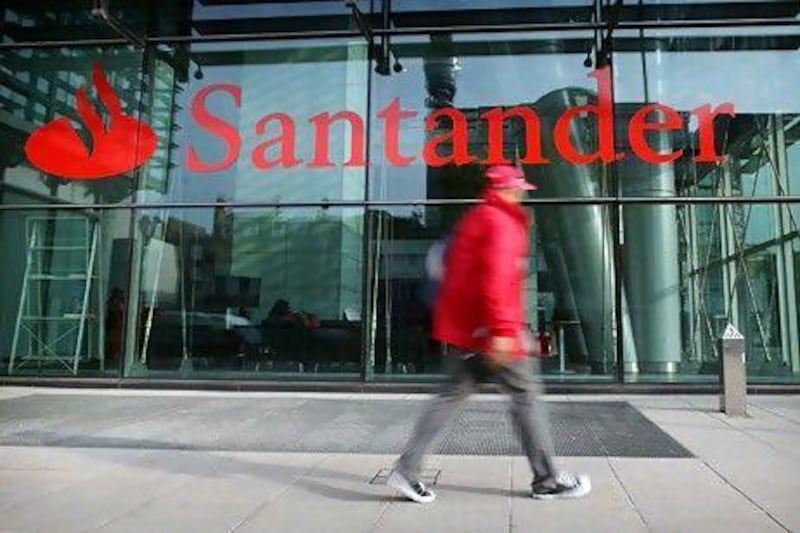Abu Dhabi Commercial Bank yesterday struck a key joint venture with Banco Santander, Europe's largest bank, in a move that catapults the UAE lender into dozens of international markets.
The two banks signed a partnership deal pulling together their expertise in corporate and investment banking, trade finance and consumer banking in their respective markets. It marked the start of a long-term partnership for the two banks, said Ala'a Eraiqat, ADCB's chief executive.
"Through this initiative we want to play an even greater role in bringing together domestic and international companies," he said.
ADCB is focused mainly on the Emirates, but has overseas branches in Mumbai and Bangalore in India. In contrast, Banco Santander has a much larger footprint outside its domestic market in Spain.
As well as operations in most European nations including the United Kingdom, Germany and France, the Spanish bank has units in Mexico, Brazil, Chile, Argentina, Peru and Uruguay.
ADCB said the deal would support its clients on their overseas ventures, while helping international companies and other clients of Santander to grow in the UAE.
"With banks in the Middle East emerging as important sources of financing for global clients, we recognise that there is an increasing need for strong financial institutions in the region," said Emilio Botín, the chairman of Santander.
The tie-up comes as Spain's economic woes squeeze the value of Santander's domestic business. The bank's third-quarter profits fell 94 per cent from a year earlier, it said last month, after writing off losses from property.
ADCB, which is a majority-state owned bank, reported a 3 per cent dip in third-quarter profits last week.
The deal would probably be a positive for customers of both banks doing business across their markets, said Chiradeep Ghosh, a senior analyst at Securities and Investment Company in Bahrain. "It should make letters of credit and other transactions less complex and cheaper for customers."
The deal was announced on the same day Dubai Chamber of Commerce and Industry released a set of guidelines for helping small and medium enterprises (SMEs) to access credit from banks and other sources.
Lending to the private sector dropped 1.5 per cent to Dh724 million (US$197.1m) in July from the month earlier, its lowest level since at least the start of the year. Officials at the chamber say lending rates to the private sector are far smaller than in western markets.
"Despite their integral role in Dubai's economy many of our SME members continue to face difficulties securing financing at sustainable rates," said Abdul Rahman Saif Al Ghurair,the chairman of Dubai Chamber, speaking at a seminar to launch the guidelines.
"In fact, the UAE's total bank lending to SMEs is around 3.8 per cent, when its target is 24.3 per cent, so addressing this issue has been a primary task for Dubai Chamber."
The chamber's report cites research showing one main reasonthat UAE companies fail in loan applications to banks is a lack of documentation.
Banks also needed to do more, said Mohammed Al Shihhi,the undersecretary of the Ministry of Economy.
"As far as banks are concerned, they generally prefer to fund large enterprises," he said. "Such is the situation today that it is said that it may be easier for large companies to find US$10m than for small enterprises to get $10,000."





